Vision: Can Focus on Objects up to 3 Feet Away (1-5 Months)
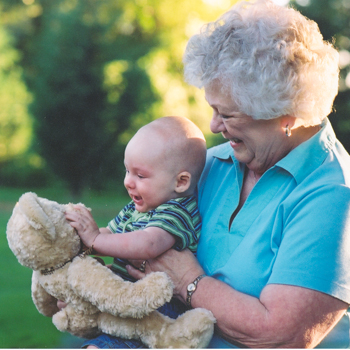
By the end of a baby’s first month, she can focus briefly on objects up to three feet away. Over the next few months, her range of vision will continue to increase. References Shelov, S. P. (Editor-in-Chief). (2004). Caring For Your Baby and Young Child: Birth to Age 5. The American Academy of Pediatrics. Revised […]
Vision: Can Discriminate among Basic Colors (1-5 Months)
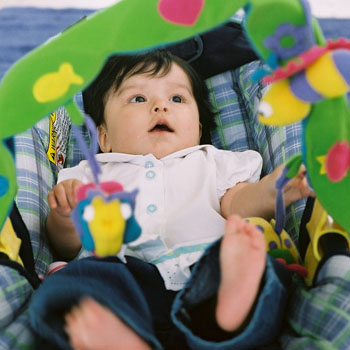
Infants soon after birth have limited color vision, and they have trouble discriminating blues from greens and reds from yellows. By 2 months, most babies can discriminate among basic colors. References Brown, A. M. (1990). Development of visual sensitivity to light and color vision in human infants: A critical review. Vision Research, 30, 1159 Shelov, […]
Can Raise the Head from a Prone Position (0-2 Months)
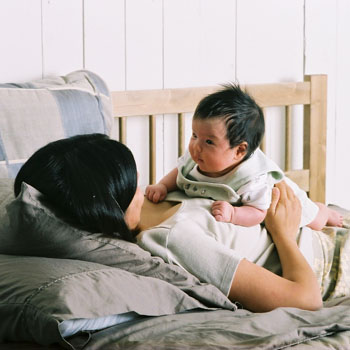
Soon after birth, most babies can raise their heads for brief periods when lying prone (on their stomachs). This is more difficult for babies than adults because of the larger head size and weight relative to their bodies. References Mercer, J. (1998). Infant development: A multidisciplinary introduction. Pacific Grove, CA: Brooks/ Cole.
Displays Rooting and Sucking Reflexes (0-4 Months)

Babies are born with a variety of innate reflexes. The rooting reflex prompts a baby to turn his head from side to side, especially if you touch his cheek or mouth. Babies are also born with the ability to suck automatically. Rooting and sucking are survival reflexes that help a baby learn how to eat, […]
Taste: Prefers Sweet over Bitter Tastes (0-3 Months)

Infants are born with some basic taste preferences. In one research study, babies would suck faster and stronger for sweet liquids than bitter, sour, salty, or neutral (water) solutions. Also, sweet tastes tend to reduce crying and lead to contented facial expressions, whereas bitter solutions tend to elicit expressions of disgust. References Crook, C. (1987). […]
Smell: Recognizes Scent of Mother’s Breastmilk (0-6 Months)

Young babies are attracted to the scent of their mothers’ breastmilk and prefer it to other women’s milk. In one experiment, two breast pads were placed on the sides of newborns’ heads only a few days old. On one side was the breast pad from the infant’s mother, and on the other, the pad from […]
Smell: Prefers Sweet Smells over Bitter or Acidic Smells (0-3 Months)
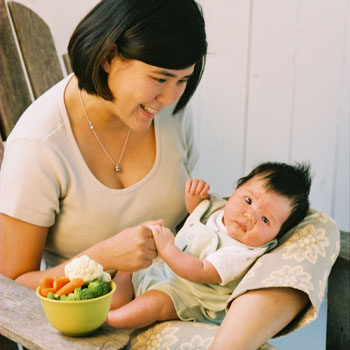
Newborns are attracted to the smell of breastmilk, and experiments show that they will vigorously turn away from bitter or acidic smells such as vinegar, ammonia, or rotten eggs. References Shelov, S. P. (Editor-in-Chief). (2004). Caring for Your Baby and Young Child: Birth to Age 5. The American Association of Pediatrics. Revised edition. New York: […]
Hearing: Well-Developed, except for Very Quiet Sounds (0-3 Months)

Even before birth, babies have been shown to respond to sound stimuli within a limited range of sound frequencies. At birth, most babies hear quite well with the exception of very quiet sounds. References Aslin, R. N., Pisoni, D. B., & Jusczyk, P. W. (1983). Auditory development and speech perception in infancy. In Haith. M. […]
Vision: Tracks Slowly Moving Objects (0-2 Months)
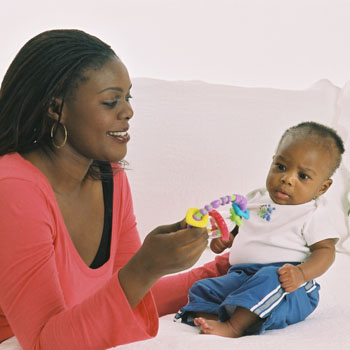
Although vision is limited at first, moving objects catch newborns’ attention. Babies are likely to track an object with their eyes as long as the target moves slowly. References Banks, M. S., & Salapatek, P. (1983). Infant visual perception. In Haith, M. M., & Campos, J. J. (Eds.), Handbook of child psychology. Infancy and developmental psychobiology. […]
Vision: Focuses on Objects from 8 to 15 Inches Away (0-2 Months)

Babies are born with limited vision, but soon after birth, they can focus on objects about 8 to 15 inches away. By 1 month, most babies can focus on objects up to 3 feet away. References Atkinson, J. (1984). Human visual development over the first 6 months of life: A review and a hypothesis. Human […]
